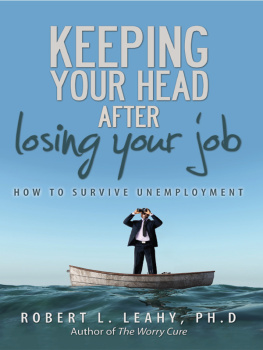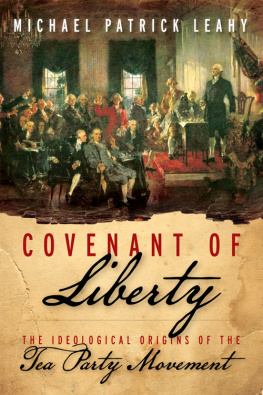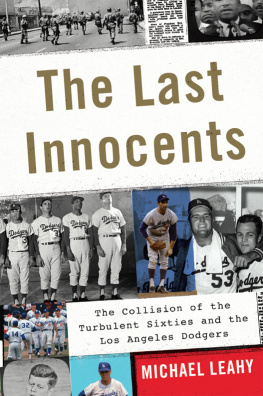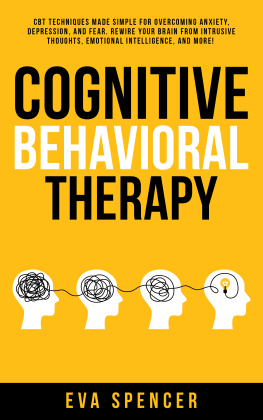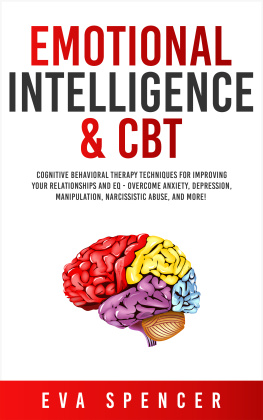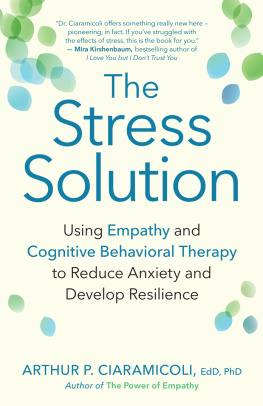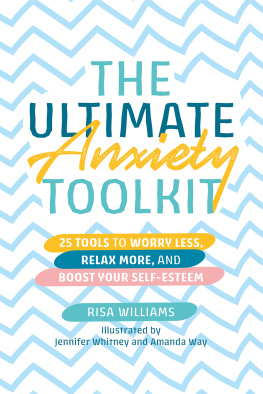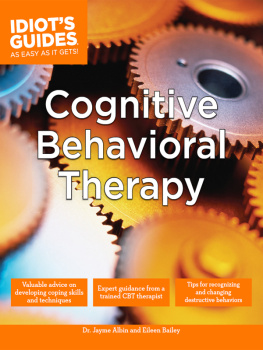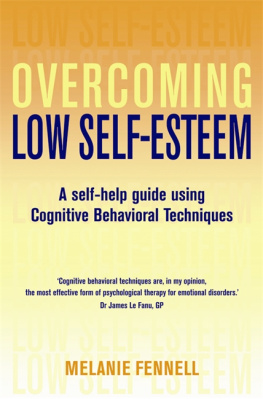Leahy - Keeping your head after losing your job: how to survive unemployment
Here you can read online Leahy - Keeping your head after losing your job: how to survive unemployment full text of the book (entire story) in english for free. Download pdf and epub, get meaning, cover and reviews about this ebook. City: London, year: 2014, publisher: Behler Publications, LLC;Piatkus, genre: Religion. Description of the work, (preface) as well as reviews are available. Best literature library LitArk.com created for fans of good reading and offers a wide selection of genres:
Romance novel
Science fiction
Adventure
Detective
Science
History
Home and family
Prose
Art
Politics
Computer
Non-fiction
Religion
Business
Children
Humor
Choose a favorite category and find really read worthwhile books. Enjoy immersion in the world of imagination, feel the emotions of the characters or learn something new for yourself, make an fascinating discovery.
Keeping your head after losing your job: how to survive unemployment: summary, description and annotation
We offer to read an annotation, description, summary or preface (depends on what the author of the book "Keeping your head after losing your job: how to survive unemployment" wrote himself). If you haven't found the necessary information about the book — write in the comments, we will try to find it.
Keeping your head after losing your job: how to survive unemployment — read online for free the complete book (whole text) full work
Below is the text of the book, divided by pages. System saving the place of the last page read, allows you to conveniently read the book "Keeping your head after losing your job: how to survive unemployment" online for free, without having to search again every time where you left off. Put a bookmark, and you can go to the page where you finished reading at any time.
Font size:
Interval:
Bookmark:
ABOUT THE AUTHOR
Robert L. Leahy (BA, MS, PhD, Yale University), Director of The American Institute for Cognitive Therapy (www.CognitiveTherapyNYC.com), completed a Postdoctoral Fellowship in the Department of Psychiatry, University of Pennsylvania Medical School under the direction of Dr. Aaron Beck, the founder of cognitive therapy. Dr. Leahy is the Past-President of the Association for Behavioral and Cognitive Therapies, Past-President of the International Association of Cognitive Psychotherapy, Past-President of the Academy of Cognitive Therapy, Director of the American Institute for Cognitive Therapy (NYC) and Clinical Professor of Psychology in Psychiatry at Weill-Cornell University Medical School. He is the Honorary Life-time President, New York City Cognitive Behavioral Therapy Association and a Distinguished Founding Fellow, Diplomate, of the Academy of Cognitive Therapy. He has received the Aaron T. Beck Award for outstanding contributions in cognitive therapy.
Dr. Leahy was Associate Editor of the Journal of Cognitive Psychotherapy (serving as Editor 19982003) and he is now Associate Editor of the International Journal of Cognitive Therapy. He serves on a number of scientific committees for international conferences on cognitive behavioral therapy and is a frequent keynote speaker and workshop leader at conferences and universities throughout the world.
Dr. Leahy is author and editor of 21 books, including Treatment Plans and Interventions for Depression and Anxiety Disorders (with Holland), Overcoming Resistance in Cognitive Therapy, Bipolar Disorder: A Cognitive Therapy Approach (with Newman, Beck, Reilly-Harrington, and Gyulai), Cognitive Therapy Techniques, Roadblocks in Cognitive-Behavioral Therapy, Psychological Treatments of Bipolar Disorder (ed. with Johnson), Contemporary Cognitive Therapy, The Therapeutic Relationship in the Cognitive Behavioral Psychotherapies (ed. with Gilbert) and The Worry Cure, which received critical praise from the New York Times and has been selected by Self magazine as one of the top eight self-help books of all time. The Worry Cure has been translated into twelve languages and is a selection of the Book of the Month Club, Literary Guild and numerous other book clubs. Eleven of his clinical books have been book club selections. His two recent popular audience books are Anxiety-Free: Unravel Your Fears before They Unravel You and Beat the Blues Before They Beat You: How to Overcome Depression.
Dr. Leahys recent clinical books include Emotion Regulation in Psychotherapy: A Practitioners Guide (with Tirch and Napolitano), Treatment Plans and Interventions for Depression and Anxiety Disorders, Second Edition (with Holland and McGinn), and Treatment Plans and Interventions for Bulimia and Binge-Eating Disorder (with Zweig). He is the general editor of a series of books to be published by Guilford Press: Treatment Plans and Interventions for Evidence-Based Psychotherapy. His books have been translated into 18 languages and are used throughout the world in training cognitive behavioral therapists.
ACKNOWLEDGEMENTS
It is always a challenge to do justice to the many people to whom I owe a debt of gratitude. But I will try.
Let me begin by thanking my many clients, friends, family members and neighbors who have shared their stories about coping with unemployment. It is their voice and experience that I wished to convey in writing this book. Often the unemployed person feels marginalized, forgotten and desperately helpless, but their stories and their examples of courage and perseverance can give hope to others.
Once again I recognize how invaluable my colleagues at the American Institute for Cognitive Therapy in New York City (www.cognitivetherapynyc.com) have been. They have been gracious enough to allow me to share my ideas about this book and their insight and experience are reflected in whatever is of value. Thanks, especially, to Dennis Tirch and Laura Oliff, who continue to educate me and support our mutual work together. My research and editorial assistant, Poonam Melwani, has been tireless in her detailed devotion to the many projects that we work on.
In North America I am grateful to the many colleagues and mentors that I have had, including Brad Alford, Aaron Beck, Judy Beck, David Burns, Tom Borkovec, David A. Clark, Frank Dattilio, Allison Harvey, Steve Hayes, Stefan Hoffman, Steve Holland, Steve Hollon, Sheri Johnson, Thomas Joiner, Marsha Linehan, Chris Martell, Lynn McFarr, Lata McGinn, Dean McKay, Cory Newman, Art Nezu, Christine Nezu, Susan Nolen-Hoeksema, Christine Purdon, John Riskind, Kelly Wilson, Terry Wilson and many others. Writing is a lonely enterprise that, ironically, reflects the voices of a multitude. Thank you to all.
Thanks, also to my many British colleagues over the years whose work continues to inform and inspire: David M. Clark, Christopher Fairburn, Melanie Fennell, Paul Gilbert, Emily Holmes, Warren Mansell, Costas Papageorgeo, Roz Shafran, Adrian Wells, Mark Williams and, of course, my good friend Philip Tata. I have been honored over many years to participate in the conferences held by the British Association for Behavioral and Cognitive Psychotherapies as well as the European and world conferences where I have been fortunate to get to know my international colleagues.
My editor at Behler Publications, Lynn Price, has been immensely supportive. Bob Diforio has been my dedicated, skilled, wise and wonderful agent for many years. His dedication to this work and to the message it represents has been far beyond the call of duty. Thank you, once again, Bob, for your friendship and support. And, to my brother, Jim, I am forever grateful for always being there, always generous, always wise. This book is dedicated to him. Finally, I once again realize that words are not enough to express the gratitude I have for my wife, Helen, who is the wind beneath my wings.

LOOKING DIFFERENTLY AT
WHERE YOU ARE NOW
You have lost your job and find yourself sinking into the depths of painful and confusing feelings. You may feel that this is one of the worst times in your life. Going home to tell your family that you are out of work is the most difficult experience that you have ever had. You feel embarrassed, you feel you have let them down, you feel that your world is crashing down on you. No longer leaving home to go to work, you sit alone, the hours drag on, then the days, and then the endless weeks out of work. You have nowhere to go.
You find yourself dwelling on your situation and think, I never thought this would ever happen to me. Often you find yourself alone with your thoughts and feelings, not knowing when you will get out of this, not knowing if you will ever get a job that you would like. You worry about your finances and what your friends and family think, and you feel embarrassed telling people that you are not working. You are angry, confused, anxious, and depressed. At times, you even wonder if this could really be true. If you are unemployed, you are not alone.
I would suggest that you think of this time as in betweenthat is, the time in your life between the last job and the next.
You are not alone
To understand how others cope with this experience, lets look at a few people who have gone through what you are going through now.
Claire had been working in her marketing job for the last six years and she thought she was doing a good job. But business had been falling off, people were spending less on marketing, and business people were afraid of the condition in the economy. For a while things were not looking good, and then the axe fell: Clare got laid off. Unemployed for four months, living alone, worried about finances, feeling like she had failed, and angry that she was in this predicament, Claire felt more and more discouraged.
Next pageFont size:
Interval:
Bookmark:
Similar books «Keeping your head after losing your job: how to survive unemployment»
Look at similar books to Keeping your head after losing your job: how to survive unemployment. We have selected literature similar in name and meaning in the hope of providing readers with more options to find new, interesting, not yet read works.
Discussion, reviews of the book Keeping your head after losing your job: how to survive unemployment and just readers' own opinions. Leave your comments, write what you think about the work, its meaning or the main characters. Specify what exactly you liked and what you didn't like, and why you think so.

